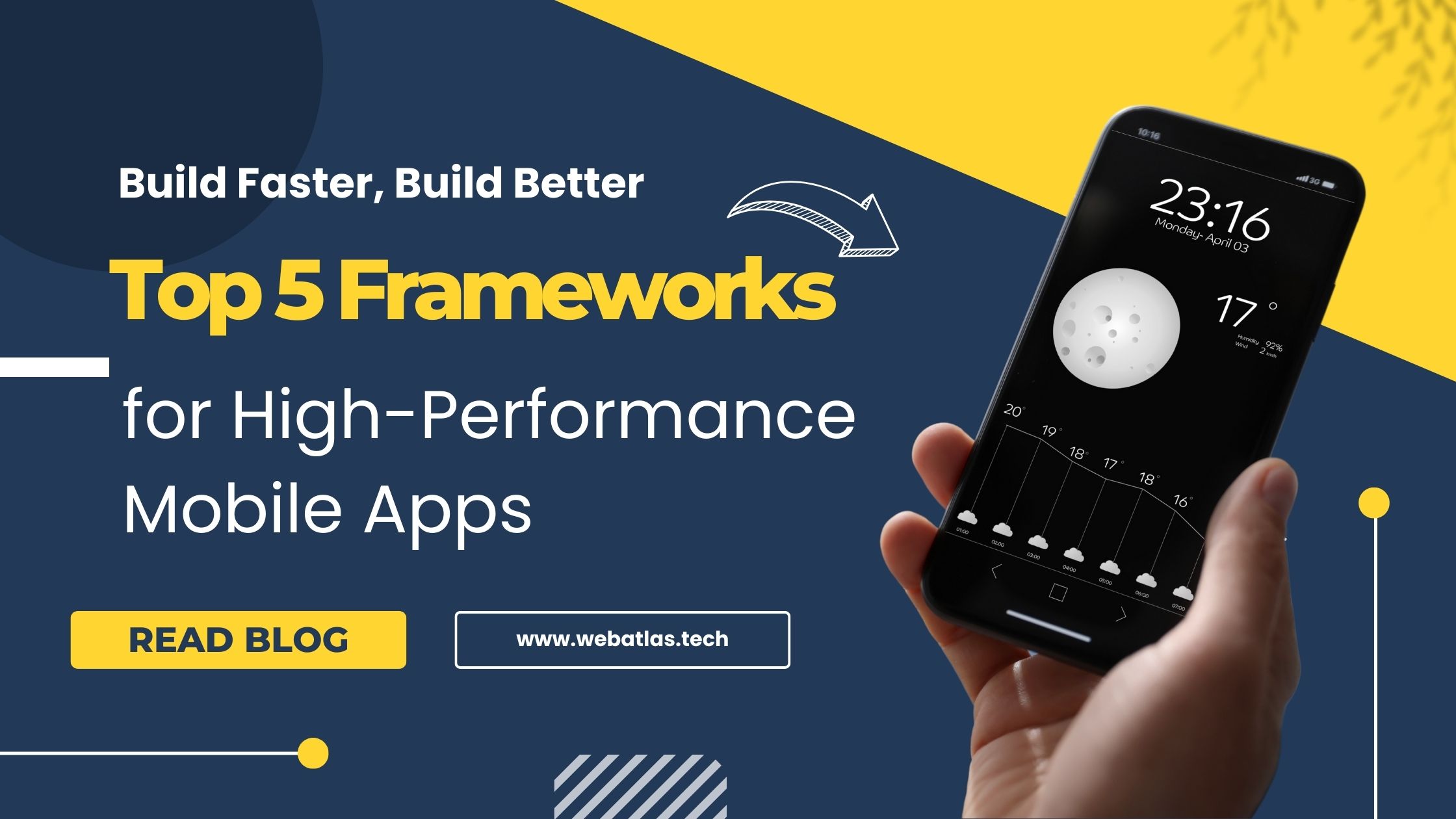Top 5 Frameworks to Build High-Performance Mobile Apps in 2024

The mobile app landscape is constantly evolving, with new frameworks and technologies emerging at a rapid pace. Choosing the right framework for your next mobile app development project is crucial for ensuring optimal performance, efficiency, and a smooth user experience. This article explores the top 5 frameworks that are well-positioned to dominate the scene in 2024, empowering you to make an informed decision for your project.
1. Flutter: Google’s Versatile Cross-Platform Powerhouse
Developed by Google, Flutter has quickly become a leading choice for mobile app development due to its robust features and extensive functionalities. Here’s what makes Flutter stand out:
- Cross-Platform Development: Flutter utilizes the Dart programming language to build native-looking apps for both Android and iOS platforms with a single codebase. This significantly reduces development time and resources compared to native development approaches.
- Rich UI and Animations: Flutter boasts a powerful rendering engine that enables the creation of visually stunning interfaces with smooth animations. This translates to a more engaging and fluid user experience.
- Hot Reload Functionality: Flutter’s hot reload functionality allows developers to see code changes reflected in the app in real-time, significantly accelerating the development process.
- Large Developer Community and Extensive Resources: Flutter enjoys a rapidly growing developer community and a vast array of readily available resources, including libraries, plugins, and tutorials.
2. React Native: JavaScript Expertise for Cross-Platform Development
Backed by Facebook, React Native is another prominent cross-platform framework that leverages JavaScript expertise to build native-looking apps. Here are some key features:
- Leveraging JavaScript Skills: Developers with existing JavaScript knowledge can readily transition to React Native, streamlining the learning curve and development process.
- Reusable Components: React Native promotes a component-based architecture, enabling developers to create reusable components across different platforms, fostering code efficiency and maintainability.
- Large Open-Source Community: React Native boasts a vast and active open-source community, providing ongoing support, libraries, and plugins for enhanced functionality.
- Third-Party Integration: React Native offers seamless integration with third-party libraries and modules, extending its capabilities and catering to diverse app functionalities.
3. Kotlin Multiplatform Mobile (KMM): Native Power with Cross-Platform Potential
Kotlin Multiplatform Mobile (KMM) is a rising star in the mobile development world, offering a blend of native development and cross-platform capabilities. Here’s why KMM is gaining traction:
- Shared Codebase for Business Logic: KMM allows developers to write a single codebase in Kotlin for the core business logic of the app. This shared codebase can be integrated with native Android and iOS UI components, promoting code reuse and streamlining development.
- Native Performance and User Experience: KMM leverages native development for UI components, ensuring optimal performance and a seamless user experience on both Android and iOS platforms.
- Gradual Adoption and Continuous Improvement: KMM is a relatively new framework, but it’s rapidly evolving with active development and community support.
4. Swift and SwiftUI: Embracing the Power of Native Development for iOS
For iOS app development projects, Apple’s native programming language, Swift, and its UI framework, SwiftUI, remain a powerful combination. Here’s what sets them apart:
- Unmatched Performance and User Experience: Native development with Swift and SwiftUI offers unparalleled performance and a seamless user experience specifically optimized for Apple devices.
- Direct Access to Apple APIs and Frameworks: Native development grants full access to the latest Apple APIs and frameworks, allowing developers to leverage the full potential of iOS functionalities.
- Focus on Developer Experience: Apple actively invests in improving the developer experience with Swift and SwiftUI, providing comprehensive documentation, Xcode development tools, and ongoing language enhancements.
5. Xamarin.Forms: Leveraging C# Expertise for Cross-Platform Development
Developed by Microsoft, Xamarin.Forms offers a mature and robust solution for cross-platform development using C#. Here are some reasons to consider Xamarin.Forms:
- C# Expertise Advantage: Developers with strong C# programming skills can readily adapt to Xamarin.Forms, reducing the learning curve and facilitating a smooth development process.
- Native Performance and Integration: Xamarin.Forms enables developers to create native-looking apps with access to native functionalities on both Android and iOS platforms.
- Integration with Microsoft Visual Studio: The seamless integration with Microsoft Visual Studio offers a familiar development environment for developers accustomed to the Microsoft ecosystem.
Also Read- How to Build a Mobile App That Drives Sales and Conversions– A Comprehensive Guide
Choosing the Right Framework: Considerations for Your Project
The ideal framework for your mobile app development project depends on several factors, including:
- Project Requirements and Complexity: The complexity of your app’s functionalities and desired features will influence the framework’s suitability.
- Target Platforms: Whether you need an app for Android, iOS, or both will determine if a native or cross-platform approach is most appropriate.
- Development Team Expertise: Consider your development team’s skills and experience when selecting a framework. Opt for a framework that aligns with their existing knowledge for optimal efficiency.
- Project Budget and Timeline: Cross-platform development generally offers faster development times, potentially reducing costs. However, native development might be more cost-effective for simpler projects.
Webatlas: Your Trusted Partner for Mobile App Development, Product Development, and Software Testing
Webatlas, a leading mobile app development company, possesses the expertise and experience to guide you through the entire mobile app development lifecycle, from framework selection to successful launch and beyond. Our team of skilled developers, product specialists, and software testers work collaboratively to bring your vision to life. Here’s what sets Webatlas apart:
- In-Depth Framework Expertise: Webatlas boasts a team well-versed in various mobile app development frameworks, including those mentioned above. We can help you evaluate your project requirements and select the most suitable framework for optimal performance and cost-efficiency.
- End-to-End Development Services: Webatlas goes beyond just coding. We offer comprehensive services, including product strategy consulting, user experience (UX) design, development, quality assurance (QA) testing, and post-launch support.
- Data-Driven Approach: We leverage data analytics to guide development decisions, optimize app performance, and ensure your app delivers a superior user experience.
- Agile Development Methodology: Webatlas employs an agile development methodology, fostering constant communication and collaboration with you throughout the development process.
By partnering with Webatlas, you gain a reliable and trusted advisor who understands the intricacies of mobile app development. We are committed to delivering high-quality, high-performing mobile apps that drive business results and exceed your expectations.
Conclusion: The Perfect Framework Awaits
The mobile app development landscape offers a diverse range of frameworks, each with its unique strengths and considerations. By carefully evaluating your project requirements, team expertise, and target platforms, you can make an informed decision. Remember, the “best” framework doesn’t exist in a vacuum; it’s the one that best aligns with your specific project needs.
Partnering with an experienced mobile app development company like Webatlas can provide invaluable guidance throughout the selection process and the entire mobile app development journey. With the right framework, a skilled development team, and a data-driven approach, you can create a high-performance mobile app that fuels your business growth and engages your target audience.
Let's talk about your project, or just come and say hello!
Webatlas Technologies is the fastest growing web and mobile app development company



